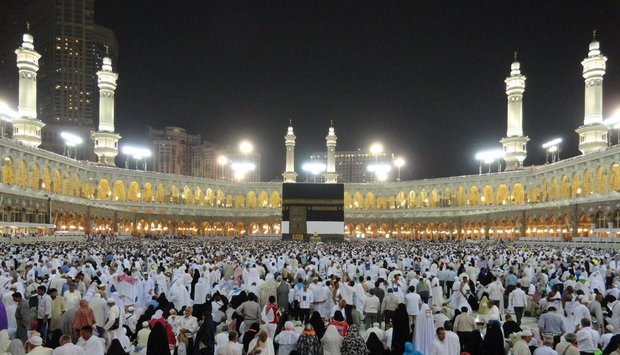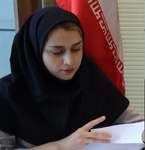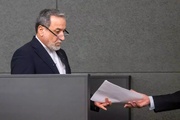The Hajj is among the five pillars of Islam, and any Muslim who can afford it must perform it at least once in a lifetime. During the month of the Hajj, Mecca must cope with as many as three million pilgrims.
One of the world's largest annual gatherings of people, Hajj, for years was marred by numerous deadly stampedes, fires, protestsand riots due to failures of crowd control.
Despite many years of experience in managing massive crowds, there are still signs that the Saudi government has been negligent in its duty to protect the people within its borders. Saudi Arabia has failed to utilize lessons from previous disasters to reduce or eliminate future consequences. A failure which has cost many faithful believers, particularly in Iran, the right and opportunity to fulfill their religious duty.
Iranian pilgrims’ absence is truly felt in the Hajj this year; this is the second time that Iranians are deprived of traveling to Mecca to take part in the annual Muslim Hajj pilgrimage after Riyadh failed to address the Islamic Republic’s concerns regarding the safety and dignity of the Iranian nationals participating in the Hajj pilgrimage.
What made 2015 Hajj turn into a tragic event for Iran was a host of incidents happening during Hajj ceremony and affected both Lesser and Greater Hajj pilgrimage by Iranian pilgrims.
The first incident happened on April 5, 2015, when Saudi officers sexually harassed the two Iranian teenage boys at the King Abdulaziz International Airport in Jeddah as a result of which Iran stopped sending pilgrims for the Lesser Hajj until the fate of that case is determined at court, a case which Saudi officials did not take it seriously and defined the minimum sentence for them, which even was not carried out later. Saudi Arabia did not punish the officers, nor did it offer apologies to the Islamic Republic, while, in a letter to the Islamic Republic of Iran's consulate in Jeddah, the Saudi foreign ministry had announced that the two officers would receive maximum penalty; a claim which has so far proved to be a sheer lie.
Meanwhile, years ago in 1987, more than 400 pilgrims, most of them Iranian Shia pilgrims, were killed when security forces of Saudi Arabia crushed and opened fire on the pilgrims, during an anti-US and anti-Israel protest in Mecca. After the Saudi scandal, Imam Khomeini boycotted the Hajj for three years, from 1988 to 1990, inclusive. In 1991, Iran and Saudi Arabia renewed diplomatic relations after coming to an agreement to allow Iranian pilgrims to perform the Hajj again.
For more than a decade, Iranian pilgrims participated in the rituals without any major problems (minors including quality of services provided to them). However, it doesn’t mean that there has been no more incidents; as in different years, many people have fallen casualty in dozens and hundreds to misconduct of organizers in stampedes, fire incidents, construction failures, etc. Iran had by then learned how to organize its own pilgrims in the best possible manner to avoid such incidents.
During 2015 Greater Hajj, two deadly incidents killed thousands of people, among them hundreds of Iranians, and received the title of deadliest disaster in the history of hajj pilgrimage, once again indicating the Saudis’ inability to guarantee the safety of pilgrims.
On September 11, 2015, a crane fell in the grand mosque, ten days before official beginning of Hajj rituals and left 118 people dead and 394 injured. 11 Iranian pilgrims lost their lives and more than 30 others suffered injuries.

On September 24, 2015, at least 460 Iranians were among thousands of pilgrims who died in a stampede which broke out in Mina, near Mecca, during the Hajj pilgrimage. The incident happened in Mina at the intersection of two streets leading up to Jamaraat Bridge.
Head of Iran's Hajj and Pilgrimage Organization Saeed Ohadiexpressed regret over the event saying that there were three tragedies in the Mina incident; the first catastrophe happened when Saudi government deliberately blocked ways of the pilgrims and led them to the direction which made the way highly tumultuous and eventually due to negligence of the Saudi government, the tragedy happened.

He also slammed Saudi government for failing to provide appropriate emergency facilities, saying ‘it would have been possible to save many of the victims,’ if they had simply given water to people caught in the stampede or had not kept all the injured and the dead altogether in locked-up containers.
Leader of Islamic Revolution Ayatollah Seyed Ali Khamenei declared three days of national mourning in Iran strongly criticizing Al Saud for lacking ability and management in controlling the pilgrimage, saying the running of the Hajj must be handed over to Islamic states.
Iran’s President Hassan Rouhani also said that the tragic incident showed lack of foresight on the part of Saudi rulers which led to the killing of thousands of men and women from across the Muslim world, including Iran.
Following the deadly incidents in 2015, Saudi Arabia once again came under fire for their inability to ensure the safety of hundreds of thousands of pilgrims who converge on Mecca every year.
Following the diplomatic tensions between Riyadh and Tehran which ended up in cutting the diplomatic ties between the two countries, Iranians lost the opportunity to participate in Hajj. Iranian officials came into negotiations with Saudi officials to pave the way for visa issuance and set the ground for Hajj travelers from Iran, but Saudi government showed no flexibility and curbed the path of negotiations.
After months of efforts, Iranian Hajj and Pilgrimage Organization announced on May 29, it won’t dispatch pilgrims this year to Mecca. The Saudis ignored the absolute right of the Iranians to perform Hajj.
Iran’s Minister of Culture and Islamic Guidance Ali Jannati also announced on May 29, that due to obstructionist measures taken by Saudi Arabia, it would not be possible for Iranian pilgrims to attend the Greater Hajj ceremony during the current year.
The announcement came after two rounds of negotiations between representatives of Iran and Saudi Arabia aimed at providing necessary conditions for presence of Iranian pilgrims in this year’s Hajj. Both rounds of talks, however, ended up in failure due to impediments created by the Saudi side.
One year has now passed since the ominous incidents in Saudi Arabia, however, they have refused to offer the smallest amount of cooperation in this regard and provision of compensation for the victims. They even refused to return bodies of many victims to their countries and many were buried without their relatives’ consent and even some without any identification. This also could have happened to Iranian victims if it was not for strong and serious position-taking of Ayatollah Khamenei; “Saudi officials fail to do their duties and act against their responsibilities and show slyness in some cases; if Iran wants to react, Saudi Arabia’s conditions will not be good. We have so far shown self-restrain in several cases. In case of reaction, our response will be firm and severe,” had asserted the Leader.
Families of the victims of the Mina tragedy have taken legal action with Iranian courts of Justice against the Saudi government to seek compensation in line with Universal Jurisdiction, the other substantive law governing relationships of member states of the United Nations.
Saudi Arabia is accused of blocking the path leading to Allah, and raising obstacles against Iranian pilgrims. As the Islamic Revolution Leader has repeatedly underlined, all Muslim pilgrims across the world must fundamentally reconsider the management of the two holy places and the issue of hajj due to constant and frequent mismanagement and oppressive behavior of Saudi rulers towards God’s guests.
“Negligence in this regard will confront the Islamic Ummahwith more serious problems in the future,” Ayatollah Khamenei had emphasized.



























Your Comment